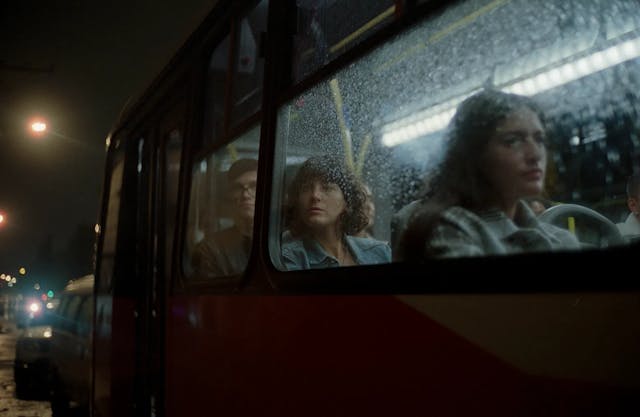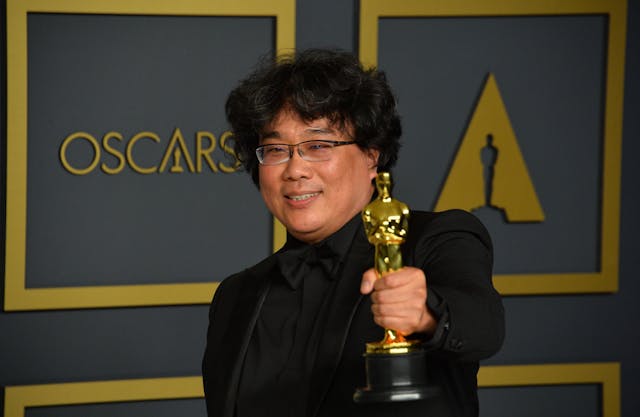"Green Border": Art House Drama Full of Fury at Anti-Immigrant Europe

Bashir (Jalal Altawil) can only do so much to care for his family while migrating in Agnieszka Holland's "Green Border" / Photo courtesy of Kino Lorber.
There is striking anger in Polish director Agnieszka Holland’s “Green Border.” Her latest film places the viewer in the middle of the refugee crisis rolling through Europe - and most of the Western hemisphere - zeroing in on a particular ring of hell between Belarus and Poland. The ‘green border’ of the tile is an ancient forest that serves as a no-man’s-land. It may have all the signs of an art house bleeding heart. It's a black and white movie about a devastating social problem. It arrived in theaters after a long run through prime film festivals - it opened at the Venice Film Festival, where it took seven awards, including the Special Jury Prize.
Don't be mistaken. There is no affectation in Holland's lacerating drama. Holland, working with cinematographer Tomasz Mainiuk, fades from a verdant overview shot of the forest into stark black and white for something more than aesthetic reasons. This creative choice prevents the beauty of the landscape from tricking you into thinking this is paradise. Well, it may be a paradise for the Polish folks who forage for wild mushrooms and get some exercise on its trails. The space turns into a sort of gray hell for thousands of migrants who end up trapped between two countries that weaponized their desperate needs and turned them into political weapons.
We follow the trials and tribulations of a Syrian family that includes father Bashir (Jamal Altawil), mother Amina (Dalia Naous), a grandfather (Al Rashi Moahamad), and two small kids. On the plane to Belarus, they meet Leila (Behi Djanati Atai), an Afghan woman traveling alone who is also trying to cross into Poland to find refuge in Europe. On the other side, we have border guard Jan (Tomasz Wlosok), instructed by his superiors to treat refugees as animals. Fortunately, some citizens try to help: Marta (Monica Frajczyk) leads a group of volunteers that provides first aid on the ground: food, medicine when needed, and legal assistance to request asylum - which doesn’t prevent them from being expelled back to uncertainty. Julia (Maja Ostaszwenska) is a psychologist who lives near the forest. While walking her dogs, she might happen upon the dead body of a migrant, prey to hypothermia. No wonder she joins the efforts of Marta’s humanitarian work but is soon frustrated with her insistence on working within the limits of the country’s brutal laws. How far is Julia willing to go to do what’s right?
Can you blame Julia for her radicalization? The same forest through which she walks her mutts serves as a grave for those migrants who manage to escape the authorities only to die of hypothermia or drown in sandtraps. Migration may be the biggest issue of our times, and filmmakers are tackling it fearlessly. Just a few months ago, Matteo Garrone’s “Io Capitano” followed the hellish trek of two teens from Dakar to Italy. The movie got an Oscar nomination for Best International Film. You can tell these are not award-bait exercises but considered heart-broken explorations of a social problem by substantial artists that try to make sense of humanity’s capacity for cruelty. You can only find solace in those who aim to help, but their best efforts are not proportional to the worst aggressions from those who do the powerful's dirty work.

Julia (Maja Ostaszwenska) goes from sensitive to radical in Agnieszka Holland's "Green Border" / Photo courtesy of Kino Lorber.
Holland knows you can’t fix the problem from behind a camera. The best thing a movie director can do is to bear witness. With luck, you might awaken empathy in those who can change things. Not politicians, really, but the citizens that elect them. Ultra-conservative Polish president Andrzej Duda has not spent almost a decade in power without the support of enough people.
Holland is no stranger to political cinema. She grew up in a place, and at a time, where the exercise of power over people was flagrant, without any semblance of democracy to ease the blows. She was born in Poland in 1948, just as the Soviets turned the country into one of its satellites. Growing up behind the Iron Curtain, she was just a child when her father, a communist journalist, plunged to his death while being interrogated by the secret police - to this day. To this day, nobody knows if it was murder or suicide. She attended film school in Czechoslovakia and worked with Andrej Wajda and Krzysztof Kieslowski. Her international breakthrough came with “Europa Europa” (1990), a real-life drama about a Jewish boy passing for Arian during the III Reich. The movie got her a Best Adapted Screenplay Oscar nomination.
The doors of World Cinema opened to her. She made “Olivier, Olivier” (1993) in France, “The Secret Garden” (1993) in the U.K., and “Washington Square” (1997) in the U.S. She gave Leonardo Dicaprio one of his first, most daring adult roles as queer poet Arthur Rimbaud in “Total Eclipse” (1995). Hollywood gave her a prime spot as director-for-hire for many Golden Age TV series, doing episodes from HBO’s “The Wire” to Netflix’s “House of Cards.” In 2010, she got an Emmy nomination for directing the first episode of “Treme.”

Kiddie peril: children are not spared in Agnieszka Holland's "Green Border" / Photo courtesy of Kino Lorber.
Perhaps Holland's secret lies in how she fits comfortably in a sort of cultural no man’s land: Europe and America, film and episodic TV. Her mother was Catholic, and her father was Jewish. She came of age under communism and thrived in democracy. Far from embracing show business without looking back, she never loses an innate sense of anger. Do yourself a favor and track down her miniseries “Burning Bush” (2013), a heartbreaking, compelling look at a group of university students who took to immolation by setting themselves on fire as the only way to protest the late sixties Soviet invasion of Poland.
Holland’s duality extends to the qualities of her work. She is always both serious-minded and entertaining. But perhaps “entertaining” sounds glib in light of the tragedies she contemplates. The choral structure of “Green Border,” telling the story through the alternate point of view of several characters, may remind you of “Traffic” (Steven Soderbergh, 2000) or "Amores Perros" (Alejandro González Iñárritu, 2000). Chapter headers parcel out the narrative, adding a sense of propulsion to the events. At one point, some characters perform a rescue operation with the stamina of a gang pulling up a pulse-pounding heist. The suspense helps you to bear with the despair.
The things that get you and stick to your mind are sometimes in the margins: the black, pregnant girl cruelly tossed over the fence by jocular guards. You see how propaganda mutates into belief and manifests through violence: a veteran soldier indoctrinates Jan about how the refugees are “human missiles” deployed by Putin against their homeland. Jan’s pregnant girlfriend tells off Julia’s humanist stance, telling her migrants are “animals.” The insult reverberates several scenes later when we see the shell-shocked black, who is - was - as pregnant as the young Polish woman spewing hate.
Racism is at the heart of the anti-migration movement in Western countries. Holland finds a compelling way of implying it without using words. It is not a spoiler to say that Poland opened its borders to Ukrainian refugees as Vladimir Putin’s Russia started its invasion. It was all over the news. In "Green Border," the guards throw brown babies through barbed wire with zeal. The next day, the same men open their arms to hold blond, blue-eyed European toddlers the next day. Why would that be? What’s the distinction? Oh, yeah. It’s the color of their skin. It's no fault of the Ukrainians running for safety, but the contrast will make your blood boil. That is what Holland wants you to feel. May that indignation grow into empathy.
Want to get an email when we publish new content?
Subscribe today



























